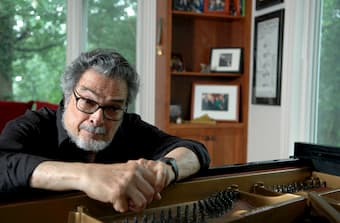
Leon Fleisher © The New York Times
Death has been on our collective minds more than usual in this year of the coronavirus pandemic. A number of well-known composers and musicians passed away in 2020, including composers Krzystof Penderecki, Nikolai Kapustin and Ennio Morricone, cellist Lynn Harrell, violinist Ida Haendel, and pianists Peter Serkin, Hamish Milne and Leon Fleisher.
While we naturally, and properly, mourn the felling of these great musical oaks, their legacy does not die with them. It lives on in their recordings and the memories of their performances (often well documented in reviews and critiques, which, thanks to the internet, are available to read almost in perpetuity), and through their teaching, where their wisdom is passed on to subsequent generations through their many students, and those students’ pupils.
Leon Fleisher, who died in August at the age of 92, is remembered as much for his fine pianism as the focal dystonia which denied him the use of his right hand for half a century, a devastating injury for any musician. But he was also a revered teacher with a long and distinguished career, mostly at the Peabody Institute at Johns Hopkins University in Baltimore, USA. A student of the great Artur Schnabel, Fleisher was nicknamed by his students the “Obi-Wan Kenobi of the piano” after the master teacher/mentor from the Star Wars films, and his many students valued his wisdom, insights and experience.
J.S. Bach: Was mir behagt, ist nur die muntre Jagd, BWV 208, “Hunt Cantata”: Sheep May Safely Graze (arr. E. Petri) (Leon Fleisher, piano)

Jonathan Biss © Jillian Edelstein
Pianist Jonathan Biss, who studied with Fleisher at the Curtis Institute of Music in Philadelphia, said he “made everything riveting”, in his playing and his teaching, with a knack for finding the perfect “phantasmagorical yet uncannily precise” metaphor to bring clarity to, for example, late Beethoven or to explain the keyboard attack required for playing Mozart. Biss, a respected pianist of the current generation and a noted Beethoven interpreter, shares Fleisher’s musical wisdom with us through his own performances and recordings, and his teaching and lecturing.

Hamish Milne
British pianist Hamish Milne, who died in February 2020 at the age of 80, was noted in particular for his advocacy of the music of Nikolai Medtner, though his discography was wide-ranging and adventurous. He had a long teaching career at London’s Royal Academy of Music, where his pupils included Gabriela Montero and Viv McLean.
A notably quiet man, as a teacher Milne was known for his integrity, sincerity and pragmatism, and his aim when teaching was to meet the student on his/her own terms, and try to help the student play better. This may sound simplistic, but through his thoughtful coaxing and suggestions, he gave his students the wings to give their music flight, to “elevate a performance, making it wiser, deeper and often easier” (James Kirby, student of Hamish Milne).
Nikolai Medtner: 4 Fairy Tales, Op. 34 – No. 1 in B Minor (Hamish Milne, piano)

Gabriela Montero
Venezuelan pianist Gabriela Montero remembers Milne as a teacher who was able to “carry you to a higher understanding of the story-telling, can demonstrate, show you the path, and wait for you at the finish line while you make your way up to meet them.”
What these reminiscences demonstrate is that teaching is eternal, and while these great pianists may have passed, they never really leave their students. Such is the significance of their influence and guidance that their legacy is regularly celebrated in the performances of pianists like Gabriela Montero and Jonathan Biss, and many more.
For more of the best in classical music, sign up to our E-Newsletter



